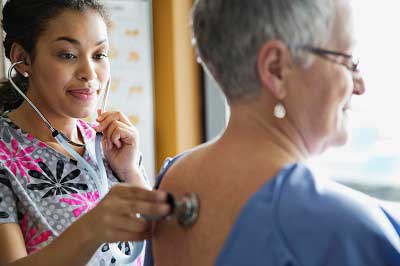
Lung cancer screenings are typically administered through low-dose CT scans, which are important for those with a high risk of developing lung cancer. The scans detect cancer in earlier stages before most symptoms occur.
You may be a good candidate for a lung screening if you:
- Are between the ages of 55 and 77
- Are still smoking or have quit in the last 15 years
- Have smoked at least 30 pack years (multiply the number of packs smoked per day by the number of years smoked)
If you have symptoms of lung cancer, a doctor will likely order a diagnostic CT scan.
About 15 percent of people are able to detect and be diagnosed with lung cancer at an early stage. When lung cancer is found at an early stage before it has spread to other organs, it is much easier to remove and treat, since it is at a less-aggressive stage and can be treated through surgery, chemotherapy or radiation. At later stages, it is more difficult to locate and completely remove all lung cancer cells throughout the body, leading to a lower cure rate as the disease worsens.
According to the U.S. Preventative Services Task Force, current screening guidelines catch about half of all lung cancer cases at an early stage. Through testing of lung cancer screenings, a low-dose CT scan is the only reliable screening method, and was the clear winner when tested over X-rays and other dosages of CT scans.
Effective in 2015, the Affordable Care Act mandates that preventive care, such as lung cancer screenings, is paid for by Medicare, Medicaid and private insurers at no cost (no co-pays, no co-insurance) to the patient.
The benefits of a lung cancer screening are that you are more likely to have nodules detected so that you can start the treatment process earlier than if you were to wait for symptoms to occur. Symptoms of lung cancer include coughing up blood, pain, shortness of breath and weight loss. Unfortunately, by the time symptoms arise, the cancer is already at an advanced state.
The risks of a lung cancer screening are quite low, as the test administered is low-dose, meaning the amount of radiation you are exposed to is very low. Another risk is receiving a false positive, which is where an abnormality shows up on your low-dose CT scan that looks like cancer and then through further testing is found to be not cancerous. In fact, about 95 percent of all positive screening results do not lead to a cancer diagnosis.
If you think you might be a good candidate for a lung cancer screening, talk to your primary care physician about whether this process is right for you, as well as the benefits and risks of a low-dose CT scan.
For more information on lung cancer screening, visit https://sarahcannon.com/. Sarah Cannon is the global cancer institute of HCA.
Health Risk Assessment
Assess your health risk for FREE with our online tool.
$webqFacilityNumber
Need a Physician?